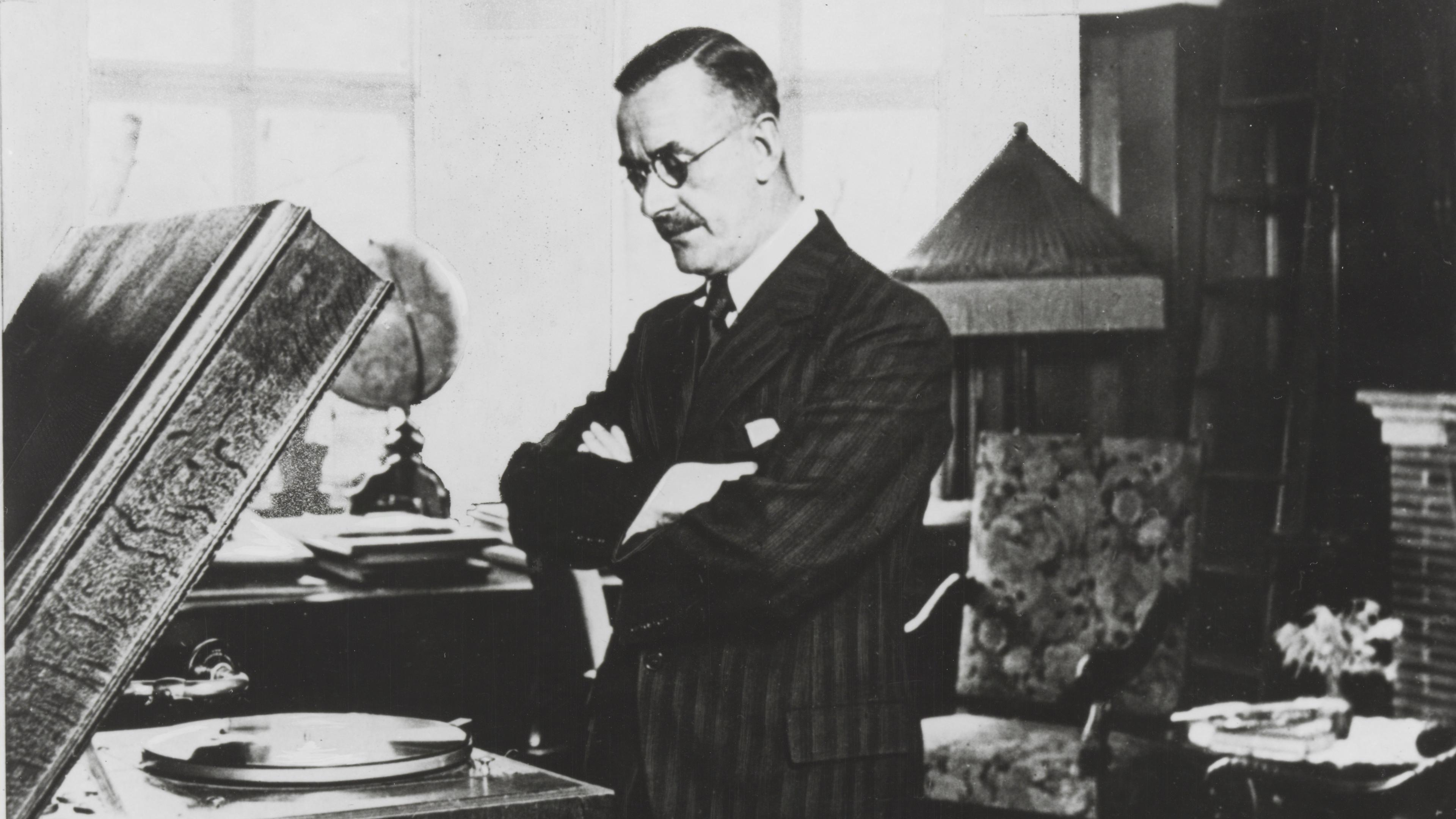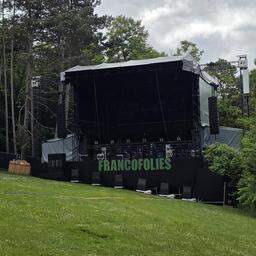Thomas Mann was born 150 years ago

His life path led him from Lübeck to Los Angeles, who turned the monarchists into one of the great defenders of democracy. With novels such as « Buddenbrooks », « The Magic Mountain » or « Joseph and his brothers », the Nobel Prize winner created world literature, in exile he became an optic counterpart Adolf Hitler. We are talking about Thomas Mann, whose birthday is on June 6th for the 150th anniversary.
The literary world has been in Thomas-Mann fever since the turn of the year, the world citizen has been recognized with a variety of events-most in Germany and Switzerland, but also in countries such as the Czech Republic or the USA. In Los Angeles, after the devastating fires at the beginning of the year on June 6th, his exile residential building in Pacific Palisades, which Thomas Mann House, reops.
The highlight, however, is a ceremony on June 6th in Lübeck, to which German President Frank-Walter Steinmeier is also invited.
Thomas Mann (left) with his brother Heinrich Mann, who was also a writer, in 1940 in New York. Photo: ETH library Zurich, Thomas-Mann Archive / dpa
Fatherly pension was enough to live as a writer
On the same day, an exhibition of the Buddenbrookhaus entitled « My time. Thomas Mann and Democracy » will open. The political commitment of the author, with whom he made a lot of enemies during his lifetime, is also in some books that have come onto the market in the past few months.
Thomas Mann was born in a Lübeck merchant family in 1875. Neither he nor his older brother Heinrich (1871-1950) showed pleasure or talent to the merchant. After the father’s early death, the trade house was liquidated, the family moved to Munich. A pension from paternal assets was enough for a carefree life as a freelance writer.
At the beginning of 1901, Thomas Mann published the novel, which was supposed to bring him the Nobel Prize in 1929: « Buddenbrooks », the story of the decline of a family, whose lifeliness decreases from generation to generation to the extent that the slope increases as a beautiful spirit. To date, 3.5 million copies have been sold in German -speaking countries.
Well -known German writers and media spoke out against his return after 1945.
But “the Magic Mountain” became even more important for the author’s worldwide reputation. The 984 -page opus is a time novel in two respects. On the one hand, it offers a panorama of society before the First World War and the spiritual currents that led to war and fascism. On the other hand, it is a novel about the individual experience of the time.
From the monarchist to the Democrat
Mann took a lot of time for this novel – from 1913 to 1924 – and he went through a deep change: probably also in demarcation to the older brother, he had joined the war driver’s camp at World War II. He wrote right -wing essays such as « Thoughts in the War » and « Considerations of an apolitical », in which he swimmed the supposed contrast between – superficial – western « civilization » and – profound – German « culture ».
However, after the Weimar Republic was founded in 1919, the monarchist was a staunch democrat, as was expressed in his Berlin speech « from the German Republic » in 1922 at the latest. In the « Magic Mountain », the humanistic form of light Lodovico Settembrini faces the reactionary Finsterling Leo Naphta.
Thomas Mann in 1937 next to his wife Katia during a New York trip. Photo: ETH library Zurich, Thomas-Mann Archive / dpa
When “the Magic Mountain” was published in 1924, Thomas Mann had long since had a large family. Although he frankly chatted about his homoerotic tendencies in his diaries, he had made a bourgeois marriage and married the young Katia Pringsheim (1883-1980) in 1905, sprouted from a difficult-rich Munich banking and professor family. The six children were born in pairs: first Erika and Klaus (1905/06), then Golo and Monika (1909/10), finally Elisabeth and Michael (1918/19).
As Thomas Mann blew politically in the face before the Nazi « seizure of power », it became clear in October 1930 when a Sa-Mob, who was an academic Sa-Mob from Nazi Gauleiter Joseph Goebbel, tried to shed it down in Berlin in his « German speech ». A few weeks after the appointment of Adolf Hitler as Chancellor at the end of January 1933, man went into exile.
The white villa on the Pacific
After a short stay in the south of France, the man settled in Küsnacht near Zurich. In 1938 they moved to the USA, initially to Princeton on the east coast. « Where I am is Germany, » said the Nobel Prize winner at his first press conference. He received a visiting professorship and began with his “Lectures”, well -paid lecture trips, on which he explained the political processes in the Old World to the Americans.
The Thomas Mann House was largely spared by the fires at the beginning of the year in Los Angeles. Photo: Getty Images
In 1941 he switched to the US west coast. In Pacific Palisades, a district of Los Angeles, the family moved into a white villa between Palmen, today a transatlantic meeting place that Steinmeier opened in 2018 after the property was acquired by the Federal Republic of Germany.
There not only completed the « Joseph » tetralogy and wrote the « Dr. Faustus », but also wrote his radio speeches under the title « German listeners! ». They were recorded in a studio in Los Angeles, transmitted to London and sent to the Reich area by the BBC.
In 1949 he needed police protection in Frankfurt
This became a prominent opponent Adolf Hitlers, whom he optionally broke as a « fanatical idiotos », « enemy of mankind » or « incapable of contract ». He informed the Germans – who risked body and life when listening to an « enemy broadcaster » – about what was already known abroad from the Holocaust and at the same time referred to « the insane guilt », in which they got caught up and more.
Thomas Mann next to his daughter Elisabeth (around 1946). Photo: ETH library Zurich, Thomas-Mann Archive / dpa
Regarding the Allied bombing of German cities, he noticed that « Germany only received what it has distributed » and that he had nothing to object to the apprenticeship « that everything has to be paid ».
Even if he emphasized that Germany was not identical to National Socialism, he made a lot of enemies. Well -known German writers and media spoke out against his return after 1945. When he traveled to Frankfurt for the 200th Goethe birthday in 1949, he needed police protection.
Last calm at Lake Zurich
Meanwhile, the wind had turned in the United States, and the mcCarthy era moving up was defamed as a communist followers. In 1952 he returned to Europe, not to Germany, but in the Switzerland he loved so much. He lived in Kilchberg on Lake Zurich and died on August 12, 1955 in the Zurich Cantonal Hospital.
Margret Steckel’s critical look at the abysses of the GDR
Thomas, Katia and most of the children rest in the Kilchberg cemetery. The famous desk, which Thomas Mann had taken into exile, can be seen in the permanent exhibition of the Thomas Mann Archives of the ETH Zurich. The California villa was largely spared from the heavy fires in Pacific Palisades at the beginning of this year.






/s3/static.nrc.nl/wp-content/uploads/2025/06/06205808/web-0606BINspermadonatie.jpg)